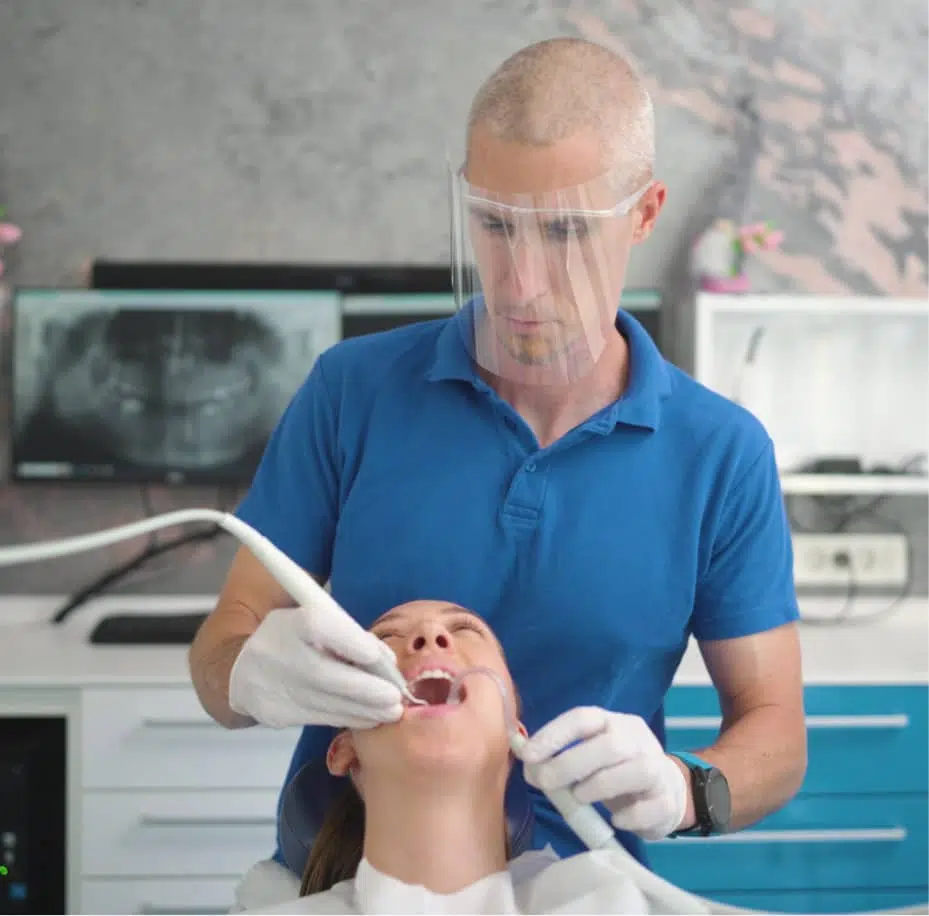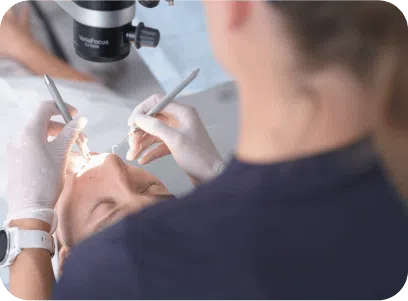Dental calculus cleaning
Even with proper oral hygiene at home, hard deposits or tartar, and stains can accumulate on your teeth from drinking coffee, tea, smoking cigarettes, and consuming heavily pigmented foods. In such cases, your toothbrush is likely inadequate, and these deposits cannot be removed at home.
Experienced professionals
Our experienced team of dentists and dental hygienists has extensive experience in dental calculus removal, ensuring a thorough and professional procedure.
Gum and dental health
Dental calculus removal is crucial for eliminating stubborn deposits and bacteria that accumulate on teeth and gums, potentially causing various issues like gum inflammation and cavities.
Aesthetic effect
Regular tartar removal contributes to a bright and beautiful smile, maintaining white and healthy teeth.
How does dental calculus form?
Dental calculus actually forms from soft plaque on the teeth that is not cleaned thoroughly. Old, uncleaned plaque starts to absorb minerals from saliva over time and becomes hard deposits (dental calculus). Even a small amount of dental calculus, with its rough surface, attracts more soft plaque, increasing the amount of dental calculus. Bacteria active in fresh plaque on the surface of teeth and tartar cause tooth decay (caries) and gum inflammation.
Inflamed gums
When gums are inflamed, they change color from pale pink to darker red, may be painful to touch, bleed when brushing and/or flossing, and recede. When gum inflammation progresses to periodontal disease, pockets start to form under the gums, accumulating more plaque and dental calculus. If these deposits are not cleaned in time, the pockets can deepen, the gums appear to detach from the teeth, and even the bone beneath the gum begins to dissolve. All this can ultimately lead to the loss of otherwise healthy teeth.

How is dental calculus removal performed?
Examination and condition assessment
The dental calculus removal procedure begins with a thorough examination of your teeth and gums. Our dentist or dental hygienist will assess the amount of dental calculus and check for any gum inflammation or other issues. This step allows us to tailor the cleaning procedure to your specific needs.


Dental calculus cleaning
The next step is dental calculus removal. The dentist or dental hygienist will use special ultrasonic devices and manual instruments to gently remove stubborn deposits and tartar from the surface of your teeth. This procedure is painless, non-invasive, and performed quickly and efficiently.
Polishing with fine paste
After the dental calculus is removed, your teeth will be thoroughly cleaned and polished to smooth them. This helps remove any remaining deposits and gives your teeth a smooth and shiny surface. At the end of the procedure, we will also provide appropriate oral hygiene advice to help you maintain healthy teeth and gums between regular dental visits.
Experienced team of experts
Our experienced team of dentists brings extensive knowledge and expertise, ensuring safe, effective, and individually tailored dental calculus removal.
Personalized approach
Each patient is unique, so we focus on individual needs and preferences, tailoring the procedure accordingly.
Minimally invasive procedure
The dental calculus removal procedure is minimally invasive, preserving the health of your teeth and minimizing discomfort.
Modern equipment
We use the most advanced ultrasonic equipment for dental calculus removal, ensuring precision and gentleness during the procedure.
Patients love us
... and their new smiles! 🙂

Modri zob Nova Gorica

Modri zob Kranj

Modri zob Kranj

Modri zob Kranj

Modri zob Nova Gorica

Modri zob Nova Gorica
Answers to frequently asked questions
How to determine if you need tartar removal?
You can quickly determine if you need professional dental calculus removal at home by closely examining your teeth in a mirror.
Dental calculus is most commonly found on the lingual side of the lower incisors and is easily distinguishable from the tooth by color. Dental calculus is also rough to the touch, which you can feel with your tongue.
Its characteristic roughness remains even after thorough brushing.
Dental calculus forms not only above the gum line but also below it. It is hidden from our eyes, but it causes just as serious diseases as the ones we see.
Your dentist at Blue Tooth will check to see if you also have tartar hidden under your gums.
How is dental calculus removal performed and how many visits are needed?
The dental calculus removal procedure is usually done in one visit and lasts between 45 and 60 minutes. First, all hard deposits (dental calculus) are removed from the teeth using an ultrasonic instrument. If necessary, the teeth are then sandblasted to remove all stains and any smaller dental calculus remnants.
For patients with periodontal disease (increased depth of periodontal pockets), root scaling and planing follow, which involves manually removing dental calculus below the gum line. This is usually done in separate visits. Typically, one visit is needed, but it can take up to four if periodontal disease is very advanced.
How often should dental calculus be removed?
We recommend having professional dental calculus removal at least once a year.
If you notice dental calculus or your dentist at Modri Zob advises you, you may need more frequent cleanings.
Once dental calculus forms, it cannot be removed by yourself. It also usually hinders the use of floss or interdental brushes. Therefore, it is best to remove it as soon as possible.
To reduce dental calculus formation, ask your dentist at Modri Zob how to properly use a toothbrush, floss, and interdental brush. Every mouth and set of teeth is different, so cleaning must be tailored to each individual. However, it is mandatory for everyone to brush thoroughly at least twice a day for at least 2 minutes. We recommend using fluoride toothpaste and flossing or using an interdental brush every evening.
Is dental calculus removal painful?
No, dental calculus removal is usually a painless procedure. We use advanced equipment to ensure the process is gentle and comfortable.
Does dental calculus removal damage teeth?
No, properly performed dental calculus removal will not damage your teeth. The dentist will be careful not to remove too much enamel and to ensure the procedure is safe.
Is dental calculus removal recommended for children?
Yes, dental calculus removal is important for children as well, as it helps prevent cavities and maintain healthy teeth and gums.
Can dental calculus removal help with teeth hhitening?
Yes, dental calculus removal can enhance the effect of teeth whitening by removing stubborn deposits and discoloration, allowing for more even whitening.
You might also be interested in...



